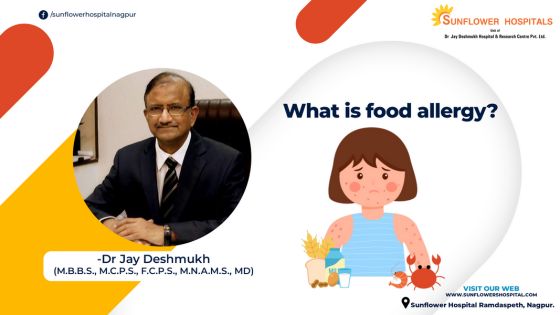Symptoms:
Symptoms may develop within a few minutes or two hours after eating the offending food. The common symptoms are itching, hives, eczema, tingling or itching in the mouth, swelling of the face, throat, lips, and tongue or other parts of the body. Itching around the eyes and redness is another common symptom. Difficulty in breathing and wheezing, nasal congestion, dizziness, light-headed, and fainting can occur in serious allergies. Pain in the abdomen, vomiting, nausea and diarrhoea.
What is anaphylaxis?
In some, a food allergy can trigger a severe allergic reaction called anaphylaxis. This causes airway narrowing, tightening, swollen throat, sensation of severe suffocation, dizziness and loss of consciousness. Emergency treatment is required for anaphylaxis.
Untreated can be fatal.
What are the common food allergies?
Food allergies are triggered by certain proteins. They are usually found in peanuts, walnuts and pecans, fish, chicken, eggs, cow’s milk, wheat, and soy. In India, many are allergic to garlic, brinjals, and chocolate. If you are allergic to pollens, you may also react to almonds, apricots, carrots, bananas, cucumbers, kiwis, oranges, tomatoes, apples, broccoli, cauliflower, onions, peaches, et al.
Conditions that are not food allergies but may be confused for the same?
Lactose intolerance is common due to the absence of an enzyme that digests lactose, a type of sugar present in milk and milk products. This causes bloating, abdominal cramps and diarrhoea. Food poisoning due to contaminated food with bacteria can cause fever, vomiting, and diarrhoea.
Is food allergy always permanent?
There is no definite answer. Allergies to milk, eggs, wheat, and soy may abate over some time. Allergies to peanuts, tree nuts, and fish may tend to be lifelong.
What causes food allergy?
It deals with IGE antibodies. They signal your immune system to release a chemical called histamine and other chemicals. These chemicals cause allergy symptoms.
Treatment:
The best way is to avoid food to which you are allergic. For minor allergic reactions, use simple anti-allergy drugs known as antihistaminic. For a severe allergic reaction, you will require an injection of epinephrine. Please carry this with you along with an appropriate syringe at all times. An auto-injector syringe containing adrenaline is also available. Thrust the needle along with adrenaline on your thigh, even if you experience early suffocation or swelling in your windpipe. Be sure to know how to use the auto-injector of epinephrine.
How do we detect food allergies?
Sometimes it becomes evident that a certain kind of food repeatedly causes symptoms. However, certain blood tests and skin tests may help. The individuals must have a detailed knowledge of food items they ate before allergies.
Author: Dr Jay Deshmukh
Dr Jay Deshmukh is Chief Physician and Director, Sunflower Hospital, Nagpur Honorary Physician to Honorable Governor of Maharashtra and PondicherryCentral. Dr Jay Deshmukh is an M.B.B.S., M.C.P.S., F.C.P.S., M.N.A.M.S., MD From Internal Medicine – Bombay and New Delhi.


